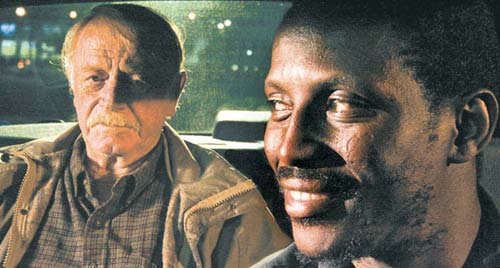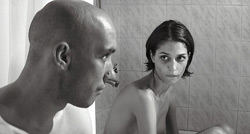
I unfortunately feel a bit of pressure early on in a festival if I haven’t seen any great movies yet. I start to wonder if I’m expecting too much, given the time and money it’s taken to get here. I ponder if seeing five movies in one day is conducive to fair judgment. And then I see a movie like Goodbye Solo.
Directed by Ramin Bahrani, who also made the fantastic Chop Shop, Goodbye Solo is about a friendly cabbie from Senegal living in Winston-Salem, NC. As the movie opens, a curmudgeonly old man (a wonderful stoic performance from Red West) has offered Solo a large amount of money to take him on a journey in a couple weeks to the top of a mountain. Solo’s playful curiosity about the trip’s purpose soon reveals that the man plans on committing suicide. Solo being who he is, he decides to persuade the man not to go through with it. How? By drawing the old man into his own life.
What follows is an exquisite story, with rich characters, spot-on dialogue, and beautiful pace. Unlike other movies I’ve seen at the festival, where I wondered why certain scenes hadn’t been left on the cutting floor, every moment of Goodbye Solo is integral to the story, every scene propels the narrative forward. Grounding it all is a star-making (and Oscar-winning, if there were any justice) performance from Souleymane Sy Savane, who is absolutely charismatic as a man persistently trying to save another man. But Bahrani has such a way with actors that the non-professionals, especially the young Diana Franco Galindo as Solo’s stepdaughter, keep up as well.
The only thing holding the movie back is that it looks like it was shot on a home video camera you could buy at Best Buy (the numerous night scenes don’t help), a flaw magnified at a festival full of gorgeous cinematography. But the deep, well-earned emotions and life-like characters that we can’t help but root for make this an early contender for best of the fest.
It’s always hard to leave a film like Solo and rush off to see another movie, but that’s what I’m doing with Rain. It’s a low-budget film from the Bahamas that I chose in part because I’d never seen a film from the Islands. And the movie provides an interesting perspective on the country, with the early scenes on one of the picturesque outer islands and the bulk of the story in Nassau. There are a couple too many travel montages for my taste, but director Maria Govan probably knows her audience better than I do.
The film actually takes place in a slum of Nassau, where a teen girl named Rain is sent to live with her drug-addicted mother. The relationship between Rain and her mom is the most interesting part of the movie, with Nicki Micheaux providing a particularly nuanced portrayal of the parent. But like many low-budget films, some of the non-professional cast aren't up to the challenge and there are more clumsy moments than you’d like. Still, the inspirational story of a girl trying to find her way and the earnest attempt to represent a place we usually only see in travel brochures made me happy to overlook the film’s obvious flaws.
I don’t have the same grace for an established director like Nuri Bilge Ceylan (Distant and Climates), who should know better than to randomly include shots of a dead son metaphorically come back to life, who should realize that you don’t treat major characters like plot devices, who should recognize that all the beautiful cinematography in the world (look at that photo!) can’t overcome a ridiculous plot and empty characters.
I was telling a friend afterwards that I found Three Monkeys particularly mystifying. Even if Ceylan is able to make a film every 2-3 years, that means he’ll probably only make about 15 movies in his lifetime. If that’s it, why would he choose material like this? Why would he spend so much time on a plot in which multiple people are offered money to spend time in jail, in which a wife engages in behavior that can only be described as unmotivated (and that’s being charitable), when a son is the emotional center of the film for the first half and then disappears completely before reappearing conveniently to wrap up some loose ends.
It’s so frustrating since Ceylan is clearly a master behind the camera. Some of his images rival Tarkovsky’s in their beauty and grandeur, especially people silhouetted against water and sky. Another long shot of a couple arguing still has me thinking about it despite that it’s one of the dumbest moments in the film. Oh well. I guess the victories wouldn’t be as sweet if we didn’t also have a few defeats.
Zift isn’t exactly a victory, but I found it to be a lot of fun. A Bulgarian movie that’s heavy on style as well as metaphors picked up in grad school (Foucault, lots of Freud, Sots Art), it also owes a significant debt to the snarky Coen brothers and Tarantino’s rapid-fire dialogue and narrators, as well as Rita Hayworth. I’m sure director Javor Gardev would embrace these references and add a dozen of his own. Zift is that kind of movie.
The story begins with a story (the movie is full of them), about a cuckolded septic tank worker who takes his revenge on his wife’s lover. The punchline, “Two and a half tons of shit can’t even make you queasy,†is all you need to know. That Balkan worldview, that life is worthless so do whatever you have to, dominates the film, but the fact that it’s set in the ‘60s makes it a not-so-subtle critique of totalitarianism and how people live and ignore their surroundings. Gardev is a first-time director, and you can tell. He’s got all these ideas he wants to play with, but not all of them work.
Fortunately, he’s also got cinematographer Emil Christov, who creates a fantastic mood with his sleek black-and-white widescreen photography and sharp angles. And what can you say about a movie in which a truly erotic sex scene is intercut with footage of a female praying mantis devouring her copulating mate? Misogynistic? Maybe, but I was smirking too much to notice.
If we’re counting up victories and defeats, so to speak, Hirokazu Kore-eda’s Still Walking is unquestionably a victory. After the widely panned Hana, Kore-eda returns to the quality he established with Nobody Knows and After Life. His latest is a bit more conventional than those or at least more accessible, but it’s just as good.
It’s a day in the life of a multi-generational family who have gathered together for the annual memorial service for a brother/son who died too early in life. The death occurred fifteen years past, so there’s no histrionics involved, but the memories are never far away. Still, the present is much more in the fore. Ryota, the eldest surviving son of an aging doctor and his wife, provides the moral center of the movie. He arrives with his wife and stepson, hoping not to talk about his uncertain job situation or get dragged into old family business. His sister is also there, with her two children and childish but good-hearted husband. The movie follows what happens over the course of a day and night as food is eaten and conversations started and finished.
The film’s joys, of which there are many, revolve around the universal elements of family. Even though Still Walking takes place in contemporary Japan, you’ll recognize your own parents, your own siblings, your own children and nieces and nephews. The way families love and bicker, the way they laugh and tease. The way they bring up the past to revel in old times and to revisit old arguments. The way children are always children to their parents, no matter how old they are. One character’s line--“Children don’t necessarily grow up the way you want them toâ€--takes on a variety of meanings by the film’s end.
The atmosphere of Ozu permeates the film, though Kore-eda has little interest in adopting the master’s style. Instead, it’s the quietness and the movie’s humanity, along with a few visual motifs, that make the connection. That aging and death hang in the air only gives the story a greater force, which is anchored by beautiful cinematography and strong acting across the board. It’s a triumph and a wonderful end to a quite satisfying day.
Tomorrow a genuine masterpiece arrives.








I just got back from Toronto and saw Goodbye Solo and was simply blown away. I had rented both Man Push Cart and Chop Shop from Netflix before coming up, and thought both were excellent films. Although both those previous films had excellent acting, there is no doubt both Souleymane Sy Savane and Red West deserve serious Oscar looks and buzz. If you're not smiling every time you see Savane or not tearing up when you see the emotion conveyed in West's eyes in that last scene with Solo and William - there is something wrong with you! I didn't get to see Still Walking, but am looking forward to seeing it.
I guess I'm a little surprised that "Hana" was "panned" as you put it. I thought it was a delightful film. Wonder what people didn't like about it.
One of my main regrets of TIFF08 was not being able to fit in a screening of Goodbye, Solo, as I am a great fan of both Man Push Cart and Chop Shop.
Jason, I liked Hana too, and wonder if it suffered critically for being such a stylistically-opposed follow-up to the critically-acclaimed Nobody Knows? As the years go on here, I find critics don't like to switch gears quickly; they become attached to their opinions and their expectations.